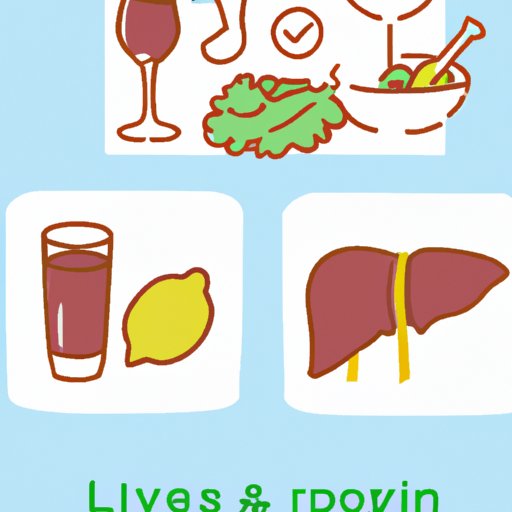Introduction
Having a healthy liver is essential for a long and healthy life. The liver is responsible for many vital functions in the body, including filtering toxins, producing bile to help with digestion, breaking down fat, and storing vitamins and minerals. A number of symptoms can arise from an unhealthy liver, such as fatigue, jaundice, weight loss, and abdominal pain. An unhealthy liver can be caused by excessive alcohol consumption, unhealthy diet, lack of exercise, or other health conditions.
Avoid Excessive Alcohol Consumption
Excessive alcohol consumption can lead to serious damage to the liver, including alcoholic hepatitis, cirrhosis, fatty liver disease, and fibrosis. It’s important to limit your alcohol consumption to reduce the risk of developing these conditions. The Dietary Guidelines for Americans recommends that men consume no more than two alcoholic drinks per day and women consume no more than one alcoholic drink per day. It’s also important to note that binge drinking, which is defined as four or more drinks on one occasion, can increase your risk of developing an unhealthy liver.
Exercise Regularly
Regular exercise can improve overall health and wellbeing, and it can also help keep the liver healthy. Exercise increases blood flow to the liver, which helps to remove toxins and other substances. It also helps to reduce fat buildup in the liver, which can lead to liver disease. To maintain a healthy liver, aim for at least 30 minutes of moderate physical activity most days of the week. Examples of moderate physical activity include walking, swimming, and biking.
Eat a Balanced Diet
A balanced diet is essential for a healthy liver. Eating a variety of nutritious foods can provide the body with the nutrients it needs to function properly. Foods that are beneficial for the liver include fruits, vegetables, whole grains, lean proteins, low-fat dairy, and healthy fats. These foods provide essential vitamins and minerals, such as vitamin B12, iron, and magnesium, which are necessary for maintaining a healthy liver. Additionally, avoid sugary drinks and processed foods, as they can increase the risk of developing liver disease.
Limit Intake of Processed Foods
Processed foods are often high in sugar, sodium, and unhealthy fats, which can lead to an unhealthy liver. Additionally, many processed foods contain artificial ingredients and preservatives, which can be difficult for the liver to process. To maintain a healthy liver, aim to limit your intake of processed foods and opt for fresh, whole foods instead. Make sure to read food labels carefully and choose products with minimal ingredients and no added sugar.
Get Regular Check-Ups
Getting regular check-ups with your doctor is important for maintaining a healthy liver. During a check-up, your doctor will likely ask questions about your diet, lifestyle, and any medications you may be taking. Your doctor may also order lab tests to check your liver enzymes and other markers of liver health. If any issues are detected, your doctor may recommend lifestyle changes or medications to help manage the condition.
Conclusion
Maintaining a healthy lifestyle is essential for keeping the liver healthy. This includes avoiding excessive alcohol consumption, exercising regularly, eating a balanced diet, limiting processed foods, and getting regular check-ups. Following these steps can help ensure your liver is functioning properly and reduce the risk of developing serious health problems. If you have any concerns about your liver health, be sure to discuss them with your doctor.
(Note: Is this article not meeting your expectations? Do you have knowledge or insights to share? Unlock new opportunities and expand your reach by joining our authors team. Click Registration to join us and share your expertise with our readers.)
